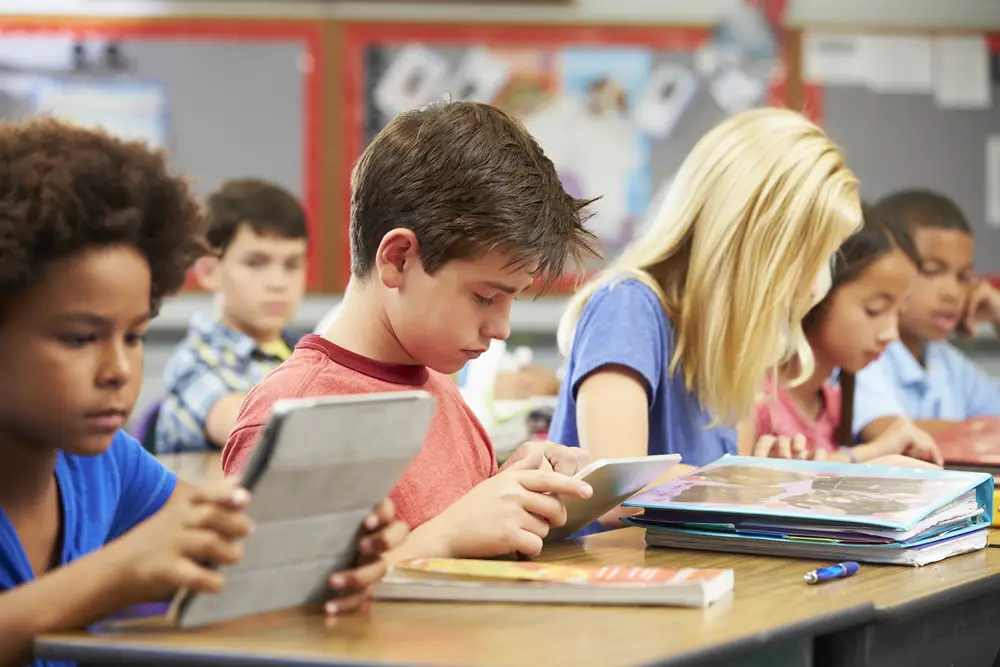Homeschool Resource | + Educational Guide for New Homeschoolers
Whether you are a parent assisting kids for the first time at home in a distance learning situation, or a regular homeschooler, home classroom management strategies plays a major role in a students success. Or you may be a parent who simply wants to supplement what your kids are already learning in a regular school classroom.
Whatever your situation, here are some valuable tips to help you enhance your child’s “at home” learning experience. We will cover home schooling structure to ensure kids stay engaged, as well as teaching ideas for parents which can be implemented on a daily basis. Throughout the article you will find helpful resources to equip your home school with the latest educational resources available to ensure an effective learning environment.
Learning Strategies at Home
Some learning strategies happen naturally at home. Providing quiet areas for independent older students who need to work on a paper is important, especially when younger siblings are being loud. Enhancing the learning environment and making it more conducive to study can also help. Using music, games, role playing or charts to present information are excellent ways to engage students.
You can take it one step further by having them help create the games or make the charts to further engage through in active learning while teaching at home.
Breaking up the lesson into twenty-minute segments can help. Before returning to the lesson, review what was learned before moving on to new material. And of course, one should always give prompt specific feedback about a student’s work.
Explore the The New Homeschooler Playbook
Are you considering homeschooling your child but don’t know where to start? This comprehensive video series has been created by veteran homeschoolers. It’s specifically focused on new homeschooling parents and guardian. Designed to equip you with the knowledge and confidence to embark on this rewarding journey.
- Sign up to receive a detailed guide on how homeschooling works and what opportunities it offers. Learn more here.
Allow for Flexibility Within Structured Learning
Interacting with adults is much easier to do at home, but teachers in classroom have also seen success in allowing students to move away from their desks and interact with classmates. This can be done in a form of activity or allowing the student to freely go for a drink of water throughout the day. At home, this is a good example of keeping things free flowing within a structure. Getting up and moving around allows for blood to flow and keep the mind alert.
This brings up another important point about exercise. While you may not be able to have structured sports daily, make sure to include some kind of exercise routine throughout the day. It can be simple floor exercises or going for a walk. If you find that your kids are having trouble paying attention, it may be a good time to stop the lesson and so some kind of physical activity for five minutes. It also brings additional benefits such as reducing screen time to ensure more balanced life.
The Importance of Asking Questions
There are other strategies that might not occur so naturally at home, such as allowing three to five seconds of wait time after asking questions throughout the presentation. These pauses allow students to process the information before, during and after the presentation of the new concept. It will also help you determine what the student knows and correct any misunderstandings. Don’t be afraid to adjusting your presentation to re-teach anything that needs clarifying.
As kids get older be sure to ask questions that involve critical thinking, such as…
Do you agree with why or how something happened or is the way it is?”
How would you prove is there a better solution?
How would you rank the importance of various situations or options?
This helps students develop critical thinking skills. Using words like “evaluate, justify, support and critique” when discussing material can help them make judgments about reality.
Remember too that the high school student is naturally interested in questions that challenge the status quo. In subjects such as Social Studies, kids care about whether a proposed course of action was expedient or inexpedient. They care about whether someone deserves praise or blame.
If any of these suggestions are making you feel overwhelmed by the sheer notion of having to supplement or replace the teaching your child was receiving in school, start with the fundamentals; Language, Reading and ways to homeschool math.
Educational Games
Educational games play an important role in helping kids get a grasp of their subject, help them see how things actually work through gameplay, and enable them to learn subjects at their own pace. Moreover, educational games help kids feel rewarded after completing a task / exercise as in-game rewards serve as gratification after they finish games and score well in after-game questions, which encourages them to think critically and try to find the right solutions. These games also help them keep a track of their lessons and mistakes, and help them assess where they need improvements. Such games do not bore kids and keep them interested for long without making studies feel like a burden.
There may be innovative educational resources that are already in your home. This is a great benefit to parents working hard to bring new teaching ideas and techniques into the homeschooling experience. Consider opportunities outside of daily teaching routines, such as the introduction of educational video games. For your children who already play online for entertainment purposes, you can engage their interest during “school hours” by allowing game play during the day with an educational focus.
The Importance of Continuous Discussion
Whether or not asking questions leads to a discussion about a topic, creating an environment for open discussion throughout any lesson is vital to keep students engaged and even excited about what they are learning. Discussions can help participant learn and stay interested in a way listening to a lecture doesn’t.
A focus on starting a discussion can also be what it takes get the ball rolling into kids asking the questions they may not even be thinking about. While this is going on, students are working out what they believe about ideas and concepts while being an active participant in learning.
Whether kids are receiving online teaching or tutoring through distance learning, parents can always enhance the education of their children. After all, the most important reason we educate our children at home is to form their minds and hearts. This can’t be done without conversation, so the best learning strategy is to talk to your children. It can often be easier to begin any discussion within an educational framework as simple as when you are helping them with homework.
A Word About Online Jobs in Teaching
If you are a parent with teaching credentials you may want to consider exploring online jobs in teaching. Let’s face it, your consistent presence at home with your kids prevents you from working in a traditional teaching job. However, there are various opportunities to teach online. These include teaching English as a second language (ESL), as well as seeking out educational jobs in an administrative role.




